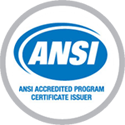Why is Food Safety Training & Certification necessary?
- Shared Responsibility. A major selling point of food is its quality – and food safety training is key to that quality. Food safety and sanitation are integral to operating a successful food service industry. The safety of food is a responsibility shared by producers, sellers, managers, and handlers.
- Affects Sales. Food safety not only affects continued patronage and sales of a food service business, but also public safety.
- Businesses Require. Many businesses require food safety training, so being food safety trained will increase your chances of employment. Furthermore, businesses are willing to pay higher wages to those trained.
- States Require. Because the CDC estimates – 76 million will become ill, 325,000 hospitalized, and 5,000 die annually in the U.S. due to foodborne infections – most states require training and a certification exam in food safety. Choose your state and get food safety trained.
Food Safety Handler Training
Individuals working in food facilities who are involved in preparing, storing, or handling food are generally required to obtain food handler training. This includes food employees that work in restaurants, cafes, bakeries, delis, mobile vendors, food trucks, bars, kiosks, convenience stores, and other food service employees.
Food handler safety training is often intended for entry-level professionals in the food service industry, such as servers, chefs, cooks, mobile food handlers, cashiers, and even c-store clerks. Food Safety Handler State Map
- Food Handler Training Course
The Food Handler Training Course is online, easy to use, and takes about 2 hours to complete. The course is ANSI-accredited, state-approved and will take you step-by-step through everything you need to know, including food safety definitions, safe hygienic practices, safe food temperatures, cross-contamination of food, and food-related illnesses.
Food Safety Manager Training Course & ANSI Certification
Food establishments generally employ a person-in-charge (PIC), or a certified food manager (CFM), who requires food safety manger certification. These establishments include: bars, restaurants, mobile vendors, food trucks, caterers, assisted-living, prison facilities, and day care centers. Food Safety Manager State Map
- Food Manager Training Course
The Food Safety Manager Principles Course provides necessary training leading up to the Food Manager Certification Exam. This course covers in-depth food safety issues, regulations, and techniques to maintain a food-safe environment.
- Food Manager ANSI Certification
Our Learn2Serve Food Protection Manager Certification is approved by the American National Standards Institute and the Conference for Food Protection (ANSI-CFP). This accredited exam is state-accepted for food manager certification requirements for Food Management Professionals. The candidate must pass the food safety examination from an accredited certification provider to be recognized as a Certified Food Protection Manager.


 Nationally Accredited
Nationally Accredited